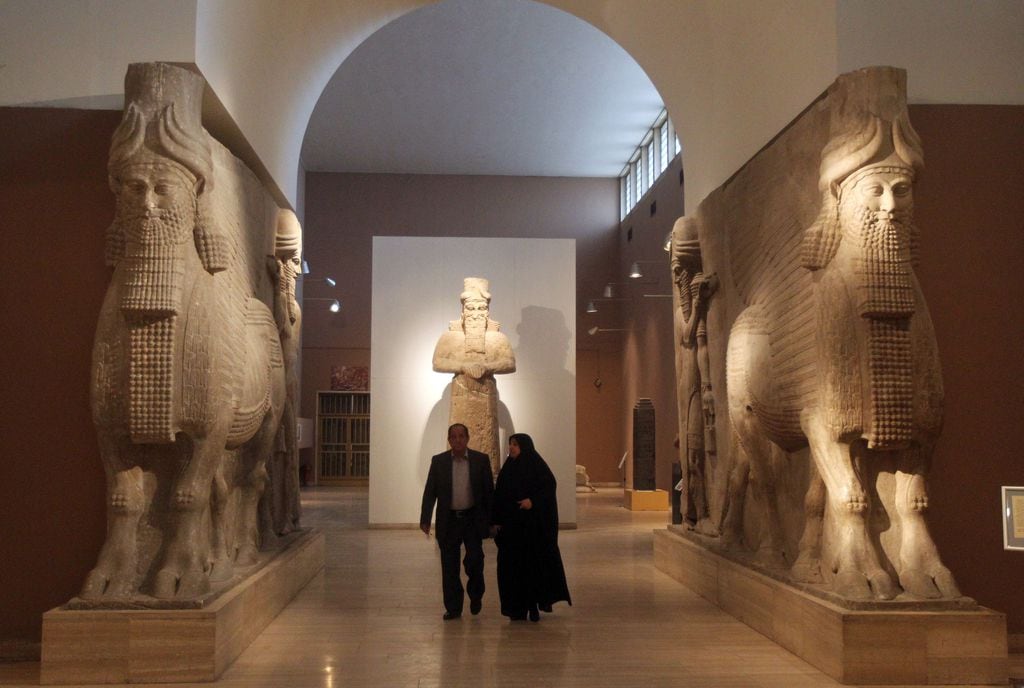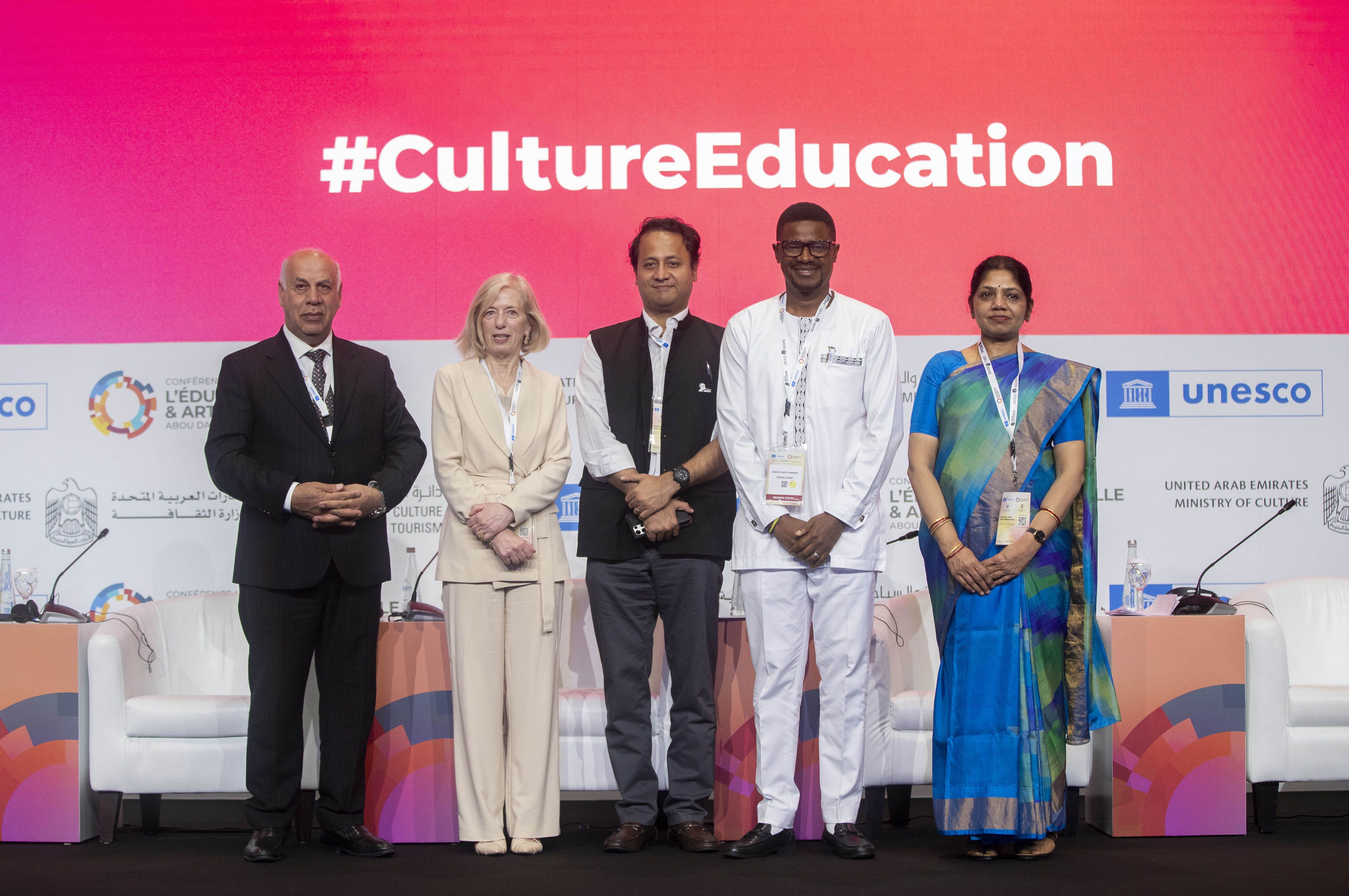The lamassu statues of Mesopotamia have an acute commonality with artificial intelligence.
They both marked “a quantum leap” of our collective capability and paved the way for a novel perspective, Ahmed Fakak Al-Badrani, Iraq’s Minister of Culture, Tourism and Antiquities, said at the ongoing Unesco World Conference on Culture and Arts Education in Abu Dhabi.
The statues, which adorned the palaces of Assyrian kings more than 3,000 years ago, feature winged bull bodies with crowned human heads. The figures presented a stride of the human imagination, Al-Badrani said.
Artists fused the body parts of disparate animals to create something that stands with impressive metaphorical stature. Wings that were representative of the sublime were attached to the body of a bull, a symbol of strength. The human head, meanwhile, was emblematic of wisdom. Their smiling expressions signified warmth and hospitality.
This artistic assemblage was an innovation at its time, “a cognitive revolution”, Al-Badrani said.
Artificial intelligence is much the same. However, that revolution may be regressive if we don’t proceed with caution, he said.

The Iraq Museum in Baghdad is home to lamassu statues. AFP
“The greater the development of artificial intelligence, the more natural intelligence goes back because natural intelligence will be increasingly dependent on artificial intelligence,” he said. “Indeed, artificial intelligence has provided opportunities, in particular in arts, architecture and other forms of art, but there are good sides and bad sides.”
So how do we implement artificial intelligence responsibly? What measures can we take to ensure digital developments are beneficial and can hone global efforts in arts and culture education?
Al-Badrani joined delegates and ministers from India, Sierra Leone and Bangladesh in a panel discussion on Wednesday to highlight key factors in implementing technological advancements in arts and culture education.
Stefania Giannini, Unesco’s assistant director-general for education, who was moderating the panel, identified three pillars. They are making culture and arts education equitable, which necessitates wider internet access; ensuring government support and healthy policies; and striving to keep up with the rate of technological transformation, taking measures to make that speed “an asset for change”.
Working on expanding internet access has been beneficial in bolstering the education sector in several developing countries. Mohibul Hasan Chowdhury, Minister of Education of Bangladesh, said the country has boosted its basic literacy rate by more than 25 per cent since 2009. Technology was a driving force in that growth.
“Our education sector suffered from a huge lack of infrastructure,” he said. “We didn’t have enough teachers. We didn’t have enough investment. And within 15 years, we have managed to achieve huge growth in our education sector, we have achieved a basic literacy level of 75 per cent.”
Over the past decade, the country has taken measures to implement information and communication technologies into its education infrastructure, Chowdhury noted.
“We are giving free computers and ICT equipment to students,” he said. “Our education budget is now the size of the country’s budget in 2006. Free books are given across the country. Infrastructures are being built.
“This has had a positive impact on our ICT-driven growth and also export of ICT-driven services out of Bangladesh.”

From left, Ahmed Fakak Al-Badrani; Stefania Giannini; Mohibul Hasan Chowdhury; Sierra Leon’s Deputy Minister of Technical and Higher Education Sarjoh Aziz-Kamara; and Smita Srivastava, director of Department of Higher Education, India. Leslie Pableo for The National
However, there are still challenges ahead. Chowdhury said it was necessary to implement policies that advocated data sovereignty for countries, with big tech companies working alongside governments.
“One challenge that we are finding in this virtual world is that in order to make targeted policy interventions, governments need to understand the situation of the students,” he said.
“Governments require data. Now, data is the first fuel of artificial intelligence. Culture has an impact on human actions, then human actions lead to data generation and then the data is processed and used for artificial intelligence.”
He added: “The challenge that we have in our part of the world, and especially from a policy point of view, is that we are not privy to the data that is generated by our students. There has to be a global consensus on data sovereignty in that policymakers need to have access to data of their own citizens.”
Chowdhury said that tech companies don’t often work with governments and local regulators, and that they are more interested in using the data for their algorithms and commercial objectives.
“But if, as governments, we could have captured the data that is generated by our people, we could have made specific policy interventions,” he said. “I think Unesco and the member states should look into where governments can work with the private sector, the technology sector and localise the data generated by its own citizens.”
This collaboration will help countries identify individual student needs and see whether they can achieve the outcomes they set out to, he said.
There are plans, Chowdhury said, to employ artificial intelligence to analyse learning gaps and learning outcomes across the country “so that we can we can make specific policy interventions”. However, for that, again a dependable pool of data is needed, he said.
If conscientious action is not taken, artificial intelligence and other digital transformations will only exacerbate ongoing social challenges, Chowdhury said, including gender stereotyping.
“We are trying to work with the private sector, but the international tech giants, of course, don’t always work with governments to localise the data, to have the data processing centres within their countries,” he said.
“We are also exposed to certain cultural aspects, which we do not feel are positive for us. For example, in terms of theology, in terms of certain western values versus eastern values, western mindset versus our country’s mindsets. Tech giants are often only importing their version of culture, theology and even pre-existing stereotyping.
“We feel that human beings will not be left out of the artificial intelligence revolution in education, and in arts and culture education, but that driving force has to be properly guided.”
News Related-
AWS and Clarity AI to use generative AI to boost sustainable investments
-
Ref Watch: 'Enough' of a foul to disallow Man City goal vs Liverpool
-
Day in the Life: Ex-England rugby star on organising this year's Emirates Dubai Sevens
-
Pandya returns to MI, Green goes to RCB
-
Snowstorm kills eight in Ukraine and Moldova, hundreds of towns lose power
-
‘This is why fewer Sikhs visiting gurdwaras abroad’: BJP after Indian envoy heckled in Long Island
-
Inside a Dubai home with upcycled furniture and zero waste
-
Captain Turner aims for Pitch 1 return as JESS bid to retain Dubai Sevens U19 crown
-
No Antoine Dupont but Dubai still set to launch new era for sevens
-
Why ESG investors are concerned about AI
-
Your campsite can harm the environment
-
Mubadala, Saudi Fund deals on US radar for potential China angle
-
Abu Dhabi T10 season seven to kick off with thrilling double-header
-
Eight climate fiction, or cli-fi, books to consider before Cop28
